"Dogs Live Criminally Short" - One Man’s Grief Post Over Losing His Beloved Dog and the Possibility of Losing Another Raises Awareness About Oral Melanoma in Dogs
You only need to meet one dog to fall in love with them for life. They help us discover happiness in the little things, like taking a car ride, and they are always happy to cuddle.
They urge us to get out and explore the world. Most importantly – they give us unconditional love.
Living with a dog is one of the best experiences in life, but it has a major downside. Namely, no matter how much you love them and how well you take care of them – you will eventually have to say goodbye.
Their lives are much shorter than ours, and every new pooch you welcome into your life will pass away eventually, leaving you heartbroken. We are aware of that. We know that things like this are inevitable, but that doesn't mean they hurt any less...
One Redditor posted his heartbreaking story to ease his pain over losing one dog and the possibility of losing another to oral melanoma. Oral melanoma is a type of oral tumor and one of the most common types of cancer in dogs.
Despite its prevalence, many pet parents are not aware that the discreet signs and symptoms of this type of tumor indicate cancer. The post garnered much attention and helped raise awareness about this illness.
Take a look:
OP shared his feelings:
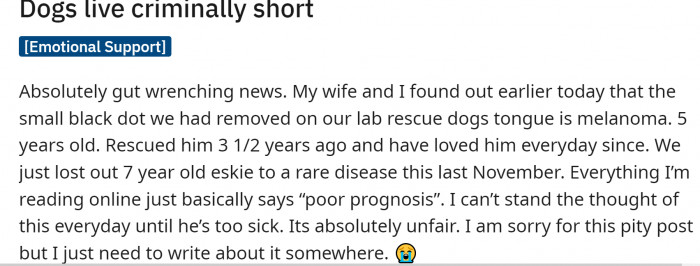
And Redditors agree:
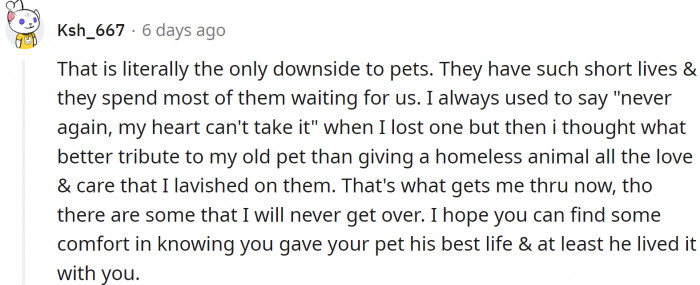
The sad fact is - you know you will have to say goodbye eventually.

The Grieving Process in Pet Loss
The emotional response to losing a beloved pet can be profound and multifaceted. Dr. Susan David, a renowned emotional agility expert, states, "The grief associated with pet loss can mirror that of losing a human family member, encompassing a range of emotions from sadness to anger." This emotional turmoil is often compounded by the fear of losing another pet, making it crucial for individuals to understand their grieving process. By doing so, they can navigate their feelings more effectively and honor their pet's memory while also addressing their emotional needs. For more insights, visit Susan David's website.
The Grief of Losing a Pet
The emotional response to losing a pet can be profound, as highlighted in this man's reflections on grief. Research from the University of Michigan suggests that the loss of a pet can trigger a grief response similar to that experienced after losing a human family member, often incorporating feelings of sadness, anger, and guilt.
This complex grieving process is influenced by the deep emotional bonds formed during the pet's life, highlighting the importance of understanding these feelings during times of loss.
OP is aware that things like this are inevitable, but that doesn't mean they hurt any less...

And it is a heavy price to pay...

But it is worth it. Always.

Moreover, the anticipation of losing another pet can trigger anticipatory grief, a phenomenon well-documented in psychological literature. Anticipatory grief occurs when individuals begin to mourn a loss before it happens, often leading to heightened anxiety and emotional distress. Research from Stanford University suggests that acknowledging these feelings is crucial for coping, as it allows individuals to process their emotions in a healthy way.
Providing spaces for individuals to express their fears and concerns can facilitate healing during these challenging times.
Furthermore, studies indicate that anticipatory grief can occur when a pet is diagnosed with a terminal illness, as seen in this case with the family dog suffering from cancer. According to research published in the Journal of Loss and Trauma, this form of grief can lead to heightened feelings of anxiety and sadness as owners brace themselves for the impending loss.
Understanding this phenomenon can help pet owners navigate their emotional responses more effectively.
Redditors send their love to OP and his dog.
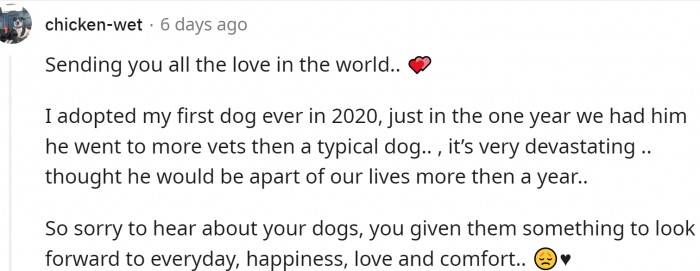
One Redditor noted that this post could help raise awareness about oral melanoma. Their friend lost a dog to that, but she helped save many dogs' lives afterward.
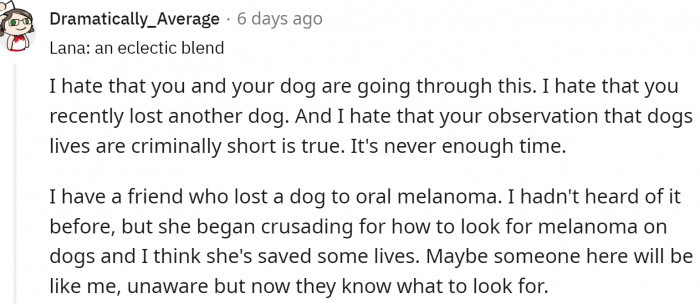
Inspect your dogs weekly for unusual bumps and lumps:

The Importance of Memorialization in the Grief Process
Creating memorials for pets can serve as an important part of the grieving process. A study from the University of Virginia indicates that memorialization can provide comfort and help individuals find closure. Engaging in rituals, such as creating a memory book or holding a memorial ceremony, can foster positive emotional expression and facilitate healing.
These acts of remembrance can also serve to reinforce the bond shared with the pet, allowing space for reflection and appreciation of the joy they brought into one’s life.
Coping Strategies for Pet Loss
To cope with the grief of losing a pet, experts recommend engaging in memorialization activities, which can provide a sense of closure and honor the pet's memory. This can include creating a scrapbook, planting a tree, or holding a memorial service, as research indicates that these activities can facilitate the grieving process.
Additionally, seeking support from others who have experienced similar losses can be incredibly beneficial. Studies show that sharing grief with others can reduce feelings of isolation and foster a sense of community during difficult times.
They definitely deserve to live longer.

One Redditor shared their experience. Their dog had a good life after diagnosis and treatment.
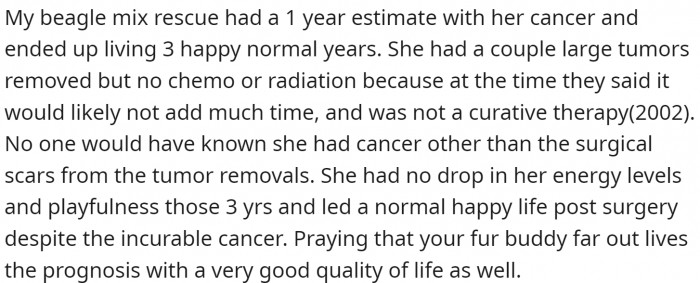
OP hopes his dog will too.

Additionally, finding community support can significantly alleviate feelings of loss and isolation. Research from the University of Chicago shows that support groups for pet loss can provide a vital space for sharing experiences and emotions. Engaging with others who understand the depth of this loss can foster healing and provide validation during the grieving process.
Encouraging individuals to seek these support networks can enhance emotional resilience and promote healthier coping strategies.
Moreover, allowing oneself to grieve without judgment is crucial. Research emphasizes the importance of acknowledging and processing emotions, as this can lead to healthier coping mechanisms and eventual healing.
Pet owners should permit themselves to feel their emotions deeply and seek professional support if needed, ensuring a supportive environment for processing their grief.
One Redditor made a good point:
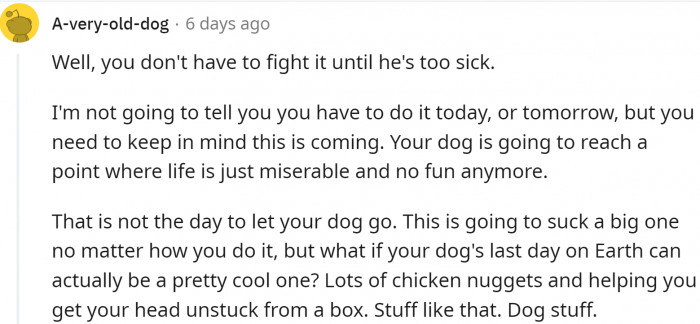
The bottom line is: make the last days count. Make every day count...

As one Redditor noted, dogs have such short lives, and they spend most of them waiting for us. That’s one of life’s greatest injustices.
But we can do something about it. Even though we can’t really prolong their lives by much (beyond their natural lifespan), we can make every day count.
We should spend time with them, but most importantly – we should make it quality time. Take your dog out, play with it, and give it treats when deserved.
Be the friend your dog deserves (although that’s difficult to achieve). Just do your best.
And your dog will recognize the effort. You have your work, family, and friends...
But your dog has only you.
Psychological Analysis
This situation encapsulates the intense emotional turmoil that often accompanies the loss of a beloved pet. Grief is a natural response to such a significant loss, and it's important for individuals to recognize that their feelings are valid and deserving of compassion. Seeking support and allowing oneself to process these emotions can be essential steps toward healing.
Analysis generated by AI
Analysis & Alternative Approaches
In conclusion, the grief experienced after losing a pet is a complex and deeply personal journey. Recognizing the emotional weight of this loss can help owners navigate their feelings and seek support as needed.
Research consistently reinforces the importance of allowing oneself to grieve and engage in meaningful memorialization to foster healing during this difficult time.
Analysis & Alternative Approaches
The loss of a pet is a profound experience that can evoke a wide range of emotions. Understanding the grieving process and finding ways to memorialize pets can significantly aid in coping. Research consistently supports the idea that community and support are vital for navigating grief, enhancing emotional well-being during such challenging times.



